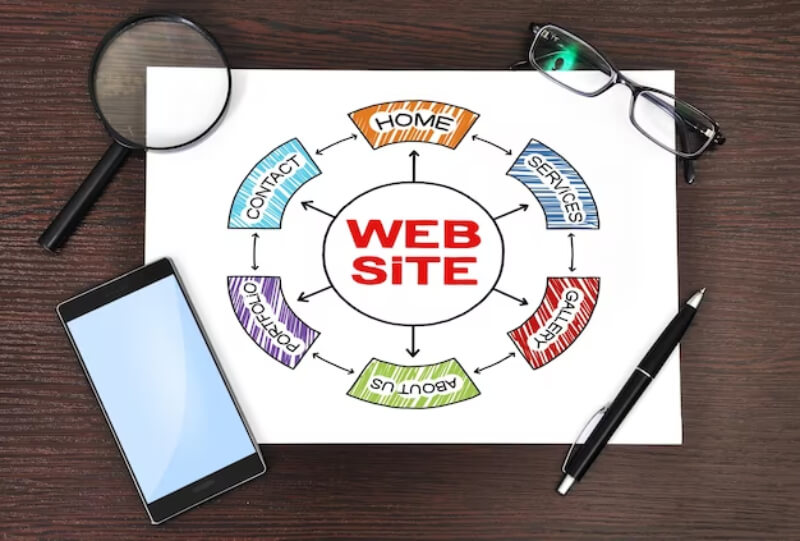In today's digital age, having a strong online presence is crucial for small businesses to thrive. A well-designed WordPress website serves as the virtual storefront of your business, attracting potential customers and building credibility.
To ensure your website effectively represents your brand and converts visitors into customers, your WordPress development services provider should cover all the necessary elements.
To achieve these goals, your small business website needs to be carefully crafted by your WordPress development company with both on-site and off-site considerations. In this comprehensive checklist, we'll walk you through the 16 small business website essentials that can make a significant difference in your online success.
On-Site Website Needs
Small business websites require a strategic approach to on-site elements to engage visitors and drive conversions effectively. Here's a breakdown of the crucial on-site website needs:

1. Good User Experience (UX)
For small businesses, a superior User Experience (UX) is pivotal. It shapes the first impression visitors have of your brand. Navigational ease, swift loading, and mobile adaptability ensure seamless device interaction.
Intuitive design, well-structured menus, and coherent content presentation enhance engagement. Anticipating user preferences streamlines their journey, making information readily accessible.
A positive UX cultivates trust, prolongs visits, and boosts conversions. In small business websites, exceptional UX is a hallmark of credibility and professionalism, leaving an indelible mark on potential customers.
2. Dedicated Product or Service Pages
Dedicated product or service pages on small business websites are essential platforms for showcasing offerings. Each page delves into comprehensive details, highlighting features, benefits, and pricing.
High-quality visuals and concise descriptions engage visitors, aiding informed decision-making. These pages personalize the customer journey, addressing specific needs and fostering a deeper connection. Incorporating customer reviews and testimonials further enhances credibility.
By providing tailored information, dedicated pages streamline the path to purchase, instilling confidence and driving conversions. In small businesses, these pages serve as virtual storefronts, effectively translating value propositions into compelling narratives that resonate with potential customers.
3. Informative Content
Informative content forms the backbone of successful small business websites. It goes beyond mere promotion, offering valuable insights and solutions to visitors. Engaging articles, blogs, and resources establish your brand as an industry authority, fostering trust.
By addressing audience pain points, you create a connection that transcends transactions. Well-researched content showcases your expertise and keeps visitors returning for more. It's a potent tool for SEO, boosting organic visibility and attracting relevant traffic.
In small businesses, informative content cultivates lasting relationships, making your website a destination for valuable information and forging meaningful connections with potential customers.
4. Trust Factors
Trust factors are pivotal for small business websites. They instill confidence in visitors, converting them into loyal customers. A well-crafted "About Us" page humanizes your brand, sharing its story and values.
Displaying genuine client testimonials and case studies highlights your credibility and track record. Certifications, awards, and affiliations showcase your expertise and industry recognition. Clear contact information and responsive customer support reinforce reliability.
Trust symbols like secure payment icons and privacy policies enhance transaction security. Small businesses thrive on trust, and these factors create a strong foundation for building lasting relationships with customers who believe in your brand.
5. Company Information
Company information is vital for small business websites. It offers a transparent view of your identity and operations, building credibility. The "About Us" page introduces your team, values, and journey, forging a personal connection with visitors.
Displaying your address, contact details, and business hours ensures easy accessibility. A map integration aids physical navigation. Sharing your mission and vision showcases purpose. This transparent approach assures potential customers that you are a legitimate and trustworthy entity.
In small businesses, conveying comprehensive company information fosters a sense of familiarity and authenticity, laying a solid foundation for customer engagement and loyalty.
6. Social Proof
Social proof is a pivotal asset for small business websites. It validates your credibility through natural interactions. Displaying customer testimonials, reviews, and ratings creates trust, showcasing the positive experiences of others.
Case studies exhibit successful collaborations, demonstrating your value. Sharing user-generated content highlights an engaged community. Visible social media follower counts amplify your reach. You establish authenticity and build confidence among potential customers by showcasing these indicators.
In the context of small businesses, social proof acts as a powerful influencer, converting skeptics into believers and fostering a sense of belonging within your brand ecosystem.
7. Placement of Call-to-Action (CTA) Buttons
Developers continue to favor JavaScript frameworks such as React, Vue.js, and Angular due to their robust toolsets for constructing complex and interactive web applications. These frameworks offer convenient features for creating reusable components, managing application states, and facilitating routing and navigation. Consequently, they are commonly employed in developing single-page applications (SPAs) and other dynamic web applications.
Responsive Design: Creating Adaptive and User-Friendly Web Experiences
The strategic placement of Call-to-Action (CTA) buttons is crucial for small business websites. Positioning CTAs prominently on relevant pages encourages desired actions.
Placing them above the fold, after informative content, or at the end of engaging blog posts maximizes visibility and conversions. Employ contrasting colors and compelling text that guide visitors towards specific actions, such as signing up, purchasing, or contacting.
A clear path to action simplifies user navigation and enhances user experience. In small businesses, well-placed CTAs are potent tools that drive engagement and conversions, directing visitors toward becoming loyal customers.
8. Email or Lead Form
Incorporating an email subscription form or lead capture form on small business websites is invaluable. These forms are bridges to lasting relationships. Offering valuable content in exchange for email addresses nurtures a loyal subscriber base for future marketing campaigns.
Lead forms allow direct interaction, collecting vital information for personalized outreach. A well-designed form with minimal fields enhances user experience and encourages participation.
In the context of small businesses, these forms facilitate direct communication, transforming casual visitors into engaged prospects. They are vital tools that empower businesses to cultivate connections and drive conversions through targeted engagement strategies.
Off-Site Website Needs
The success of small business websites extends beyond their virtual walls. Off-site elements are crucial in driving visibility, engagement, and credibility. Here's a breakdown of the essential off-site website needs:

9. SEO-Friendly Pages
Creating SEO-friendly pages is a fundamental strategy for small business websites aiming to enhance their online presence. It begins with thorough keyword research to identify relevant and high-impact keywords. High-quality, engaging content around these keywords is paramount, balancing optimization and readability.
Meta tags, including meta titles and descriptions, should be meticulously composed to encapsulate the page's essence and attract clicks. Organizing content with appropriate header tags (H1, H2, H3) improves user experience and search engine comprehension. URLs should be concise and keyword-rich, aiding in user understanding and search indexing.
Optimizing images through proper naming and alt text ensures accessibility and faster loading times. Internal links bolster site navigation and improve SEO by connecting related content. External links to authoritative sources underscore your commitment to valuable information sharing.
10. Tags and Analytics
Implementing tags and analytics is pivotal for small business websites seeking to optimize their online presence. Tags, including meta tags and tracking codes, convey essential information to search engines and other platforms.
Meta tags, such as meta titles and descriptions, encapsulate a page's content, aiding search engines in understanding and ranking it accurately. Integration of tracking codes, like Google Analytics and other pixel tags, provides invaluable insights into user behavior, traffic sources, and site performance.
These analytics empower businesses to refine their strategies, make data-driven decisions, and enhance user experience. By diligently managing tags and leveraging analytics, small businesses can fine-tune their online presence, cater to user needs, and foster meaningful connections that drive growth and success.
11. Image and Video Optimization
Optimizing images and videos is paramount for small business websites. Compressed media ensures swift loading times, preventing user frustration and decreasing bounce rates.
Appropriately named image files and descriptive alt text enhance accessibility and SEO by providing context to search engines and visually impaired users.
Videos should be properly encoded and hosted on reliable platforms to prevent buffering. Optimized multimedia content enhances user experience and improves search engine rankings, drawing more organic traffic to your small business website.
12. Quality Hosting
Quality hosting is a cornerstone for small business websites. Reliable hosting ensures consistent uptime, preventing potential revenue loss due to downtime. Fast loading speeds enhance user experience and boost search engine rankings.
Secure hosting safeguards sensitive customer data and builds trust. Scalability accommodates growing traffic and evolving business needs. A responsive support team addresses technical issues promptly, minimizing disruptions.
Investing in reputable hosting services ensures that your small business website operates smoothly, fostering customer engagement, credibility, and long-term success in the competitive online landscape.
13. Content Management System (CMS) and Technology
Selecting the right Content Management System (CMS) and technology is pivotal for small business websites. A user-friendly CMS like WordPress CMS simplifies content updates and site management, empowering non-technical users.
Its vast ecosystem of plugins and themes facilitates customization. Modern technologies ensure mobile responsiveness and optimal performance, providing seamless device experiences. Choosing a scalable technology stack accommodates future growth.
A well-chosen WordPress CMS and technology stack not only streamline website management but also lay a strong foundation for delivering engaging content, enhancing user experience, and driving the success of your small business online.
Suggestions for Small Business Websites

Optimize your small business website with clear value propositions, user-friendly design, and strategic CTAs. Regularly publish quality content, engage through social media, and showcase customer testimonials.
Prioritize SEO, ensure mobile responsiveness, and keep contact information accessible. Utilize analytics, secure your site, and maintain a fast loading speed for a successful online presence.
14. Domain Selection
Selecting the right domain is pivotal for small business websites. Go for a domain that aligns with your brand, ideally concise and memorable. A country-code top-level domain (ccTLD) suits localized businesses, while a .com domain offers global appeal. Avoid hyphens or numbers that can confuse users. A relevant keyword within the domain can aid SEO.
Ensure your domain reflects your business identity, making it easier for customers to find and remember your website. A well-chosen domain lays a strong foundation for your online presence, influencing branding, credibility, and accessibility.
15. Mobile Responsiveness
Mobile responsiveness is paramount for small business websites. With a significant portion of users accessing sites on smartphones and tablets, ensuring a seamless experience across devices is essential.
A mobile-responsive design adapts content and layout to various screen sizes, maintaining readability and functionality. This enhances user experience, reduces bounce rates, and positively impacts search engine rankings.
Mobile-friendly websites capture and retain the attention of on-the-go consumers, fostering engagement and conversions. In the competitive digital landscape, prioritizing mobile responsiveness is a strategic move that caters to the evolving habits of modern users and contributes to your business's online success.
16. Regular Content Updates
Regular content updates are pivotal for small business websites. Fresh, relevant content keeps visitors engaged and informed, encouraging repeat visits. It signals to search engines that your website is active and up-to-date, positively impacting SEO rankings.
Update product/service information, publish blogs, share industry insights, and highlight success stories to showcase your expertise. Interactive and current content establishes your authority, builds credibility, and nurtures customer trust.
In the dynamic online landscape, consistent updates demonstrate your commitment to providing value, driving user engagement, and ultimately contributing to the growth of your small business.
Conclusion
Your small business website wields immense influence over your online presence. Adhering to the 16 essential checklist items empowers you to craft a site that captivates visitors, fosters credibility, and propels business expansion.
Stay attuned to the ever-changing digital realm; consistent upkeep and enhancements are pivotal to sustaining your website's alignment with your business objectives.
If you want to make a small business website, WordPress can be a very good option. If you are looking for the best WordPress development company in India then Ways Software Technologies LLP is the best choice for you!
Comments 03

Carole Marvin.
15 january 2023 At 10:30 pm
Ne erat velit invidunt his. Eum in dicta veniam interesset, harum fuisset te nam ea cu lupta definitionem.
reply
Jaquan Rolfson.
15 january 2023 At 10:30 pm
Ne erat velit invidunt his. Eum in dicta veniam interesset, harum fuisset te nam ea cu lupta definitionem.
reply
Rik Andrew
15 january 2023 At 10:30 pm
Ne erat velit invidunt his. Eum in dicta veniam interesset, harum fuisset te nam ea cu lupta definitionem.
reply